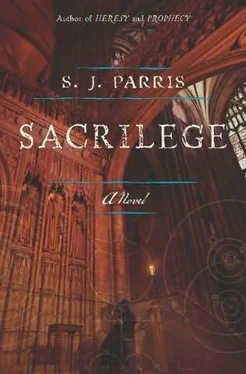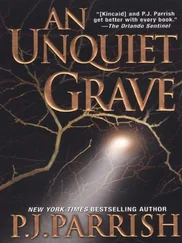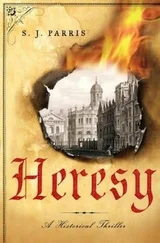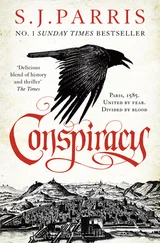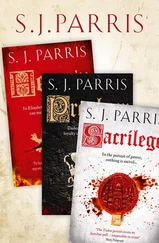At the bottom of the casket I found folded papers, and I had to fight to keep my hand steady as I reached for these; their contents must be valuable, since Langworth had taken such evident pains to hide them. On top of these papers was a bunch of keys, four altogether, of varying sizes, though two were quite large and had acquired the tarnish of age. I put them to one side and turned my attention to the letters.
The first bore a broken seal in scarlet wax with a device I did not recognise and, as I unfolded it, my heart sank; the letter revealed only a series of numbers, arranged in groups of differing lengths that must correspond to words, but impenetrable to anyone not in possession of the cipher, as the writer had intended.
I sighed. I should not have been surprised; at least the coded letter told me that Langworth’s secret correspondence was likely to be worth reading. Walsingham had a master cryptographer in his employ, Thomas Phelippes, a man of extraordinary abilities who could probably break this code in a matter of minutes just by looking at it. Though I had read a great deal about ciphers and seen a good many coded messages pass through the French embassy during the business there last autumn, I would not know where to begin in deciphering it and could easily waste hours in the attempt. I hesitated, holding the letter up gingerly between my thumb and forefinger. The paper was dog-eared and stained with what looked like drops of water on one side, as if it had been well-handled on its travels. I stared fruitlessly at the lines of numbers in the author’s tiny, neat hand. Where had it come from? I needed to make a copy—Langworth would certainly notice if I took the original, and if it should be damaged or destroyed while in my possession, crucial evidence would vanish forever—a mistake I had made once before, to my shame and Walsingham’s fury. But even supposing I had time to make a copy now, how could I get it to London? I would have to ask Harry’s servant Samuel to take it, and I doubted he would be in a hurry to do me any favours.
The letter was signed not with more numbers but with a symbol, which seemed to me oddly familiar, but though I ransacked my memory trying to place it there was no jolt of recognition. Silently, I cursed my own failure; I, who was renowned in Paris as an expert on systems of memory, yet could not pull this vital information from my own brain when it most mattered. I knew that those who corresponded in code, whether to deliver secret intelligence or illicit conspiracies, often used a symbol in place of a signature to authenticate their dispatches; when I wrote to Walsingham I used the astrological symbol for the planet Jupiter as my own mark. If the sign on the letter I now held in my hands was familiar, it was most likely that I had seen it on one of the letters that had passed through the French embassy and so, logically, Langworth must be receiving letters from someone who had been involved with the invasion conspiracy of the previous autumn. Knowing of his Catholic leanings, this was hardly a surprise; the question was: Who? Henry Howard, from his prison cell, or someone outside England? And who was his courier?
The most pressing question, though, was whether I had time to copy the letter before Langworth returned. I tucked it carefully into the leather pouch I wore at my belt and hesitated, weighing the keys in my hand. What secrets did they hold, I wondered, and did I dare remove them to find out? The house remained deathly silent. In the shard of light from the window, dust drifted gently.
Outside, the cathedral bells struck up a new peal, startling me out of my thoughts. If they signalled the end of the service, people would be spilling out into the precincts and it would be harder to leave without attracting attention. I looked down at the keys in my palm, willing myself to make a decision. Was one of these the key to Sir Edward Kingsley’s cellar?
It was reckless, I knew, but I was afraid I would not have another chance. I slipped the bunch of keys into my pouch too, closed the casket, and fiddled impatiently with the lock, my fingers made clumsy by haste, until I felt it click beneath the knife. At least if he found the casket locked Langworth might attribute the missing keys to some lapse of memory on his own part. I hid the box again under the tile and left the hidden room, returning to Langworth’s bedchamber and closing the door as silently as possible behind me. But this time I could not make the lock turn back into place, and the persistent clamour of the bells began to seem an alarm meant to warn me that time was short. Instead of easing the knife gently, as I knew I should, I tried in my haste to force it; the blade glanced off the bolt and caught the edge of my finger. A gout of blood splashed to the floor; stifling a curse, I sucked furiously at the cut and at that moment I heard the sound of a door opening downstairs, followed by voices.
Frantic, I glanced around the room. The only possible hiding place was under Langworth’s bed. I pulled the tapestry across the door, scuffed the traces of my blood away with my foot and, as quietly as I could manage, pressed myself prostrate on the floor and wriggled flat under the bed, holding my breath. The space under the bed frame was thick with dust, but the boards were warped by age and I found a gap between two of them wide enough to press one eye against. I was directly above the front room of the house, Langworth’s study. Below I could see the desk where I had found the penknife I now clutched in my bleeding fingers. As I watched, a packet was flung down onto the desk and the figure of the treasurer in his black robe crossed my line of vision.
“Well, then,” he said. “That is everything.”
“You are certain?” I could not see the face of his interlocutor and dared not move to try and see better. I remained frozen, pressed to the floor, making my breath as shallow as I could.
“Everything I could find,” Langworth replied. “It was not easy—the place was left in such disarray.”
“You did not attract attention, going there?”
The other man’s voice seemed disturbingly familiar. Langworth gave a cold laugh.
“The apothecary’s sister-in-law stands to inherit—she is a superstitious woman and would not set foot in a place befouled by murder until it had been blessed by a man of the church.”
“And now?”
“ Tacere et fidere , my friend.” Langworth’s voice grew impatient. “The threads are all unravelled. We can only bide our time and wait for news. For now, the best thing we can do is to have faith, and keep our mouths shut.”
“We must experiment further, if we hope for success,” his companion said, lowering his voice. “There are other places to buy—”
“In time,” Langworth snapped back. “There have been enough deaths lately, the town is alert. They will blame a vagrant for Fitch and hang him at the assizes in a few days. Then they will forget. Meanwhile, have you not seen the tide of refugees fleeing the plague rumours?” He folded his long fingers together and cracked his knuckles. “There will be chance enough for experiments in the days to come. God will provide. Besides,” he added, moving back towards the desk and out of my sight, “nothing can be done while the Italian is here, prying. You saw him this morning, I suppose?”
“Not today. Was he here?”
The second man spoke sharply and as he stepped forward and I was able to glimpse him, my stomach constricted and I swear for a moment my heart stopped beating. It was Samuel, Harry Robinson’s servant. A chill washed my whole body, as if I had been hit by a cold wave, as I realised the implications of this: Langworth knew exactly who I was. When he greeted me politely by my false name at the gate, he had been mocking me; if Samuel was his confidant, he must have known my identity even before I arrived. The Italian. My careful pretence was meaningless; I already had an enemy in the heart of the cathedral, an ally of Henry Howard’s who must know my part in his patron’s imprisonment. This changed everything; I could no longer imagine that I was passing unnoticed through Canterbury. Langworth must be as suspicious of me as I was of him and would be waiting for an opportunity as we danced around each other, trying not to reveal our hands.
Читать дальше
Конец ознакомительного отрывка
Купить книгу
